If you are looking to start a business in the transportation and logistics industry, starting an intermodal freight transport business can be a lucrative and rewarding opportunity. Intermodal freight transport involves the transportation of cargo using multiple modes of transportation, such as trucking, rail, and ocean shipping. This allows for greater efficiency and cost savings in the transportation process.
However, starting an intermodal freight transport business requires careful planning and execution. In this section, we will provide an overview of key steps and strategies to help you start your intermodal freight transport business successfully.
Key Takeaways
- Starting an intermodal freight transport business requires careful planning and execution.
- Intermodal freight transport involves the transportation of cargo using multiple modes of transportation.
- Intermodal freight transport can be a lucrative and rewarding business opportunity in the transportation and logistics industry.
Table of Contents
Understanding Intermodal Freight Transport
Intermodal transportation services are a vital component of the global supply chain, providing efficient and cost-effective freight logistics solutions that enable businesses to transport cargo across vast distances quickly and safely. Intermodal freight transport involves the use of multiple modes of transportation, such as trucks, trains, ships, and planes, in combination to move goods from their point of origin to their final destination.
The benefits of intermodal freight transport include reduced transportation costs, increased flexibility and scalability, improved transit times, and reduced carbon emissions. In addition, intermodal freight transport enables businesses to access new markets and expand their customer base, making it an essential component of modern cargo shipping solutions.
Freight Logistics
Freight logistics is the process of planning, implementing, and controlling the movement of goods through the supply chain. A crucial aspect of intermodal freight transport, logistics management involves coordinating and managing various transportation modes and carriers to ensure goods are delivered on time and in good condition.
Cargo shipping solutions, including intermodal transportation services, rely heavily on effective logistics management to ensure the safe and efficient movement of goods across vast distances. This involves careful planning, route optimization, and effective communication between carriers, shippers, and logistics providers.
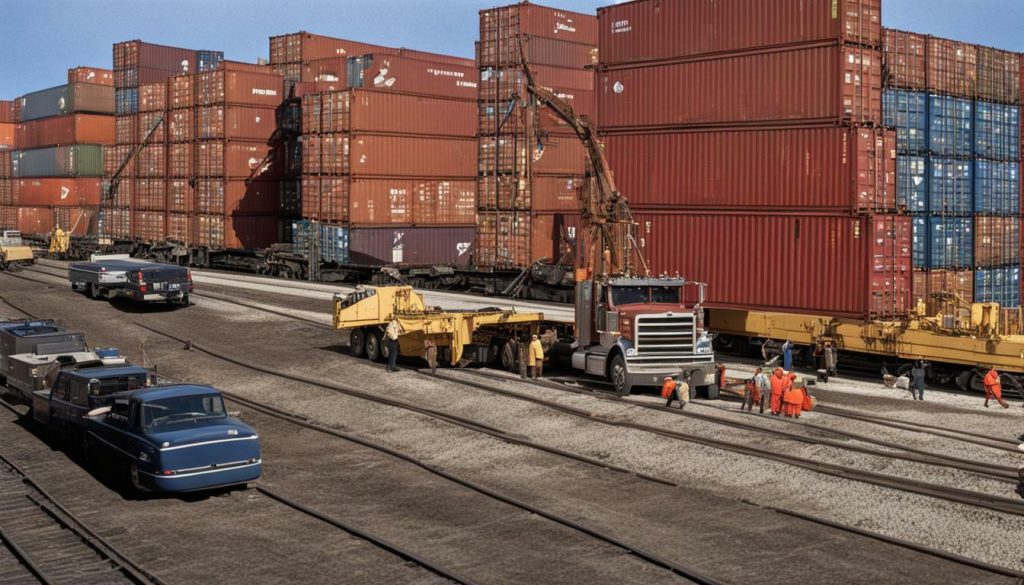
Planning Your Intermodal Freight Transport Business
Starting an intermodal freight transport business can be a complex and challenging process, but with proper planning and preparation, you can establish a successful enterprise. One of the key considerations when starting an intermodal freight transport business is transport logistics, which involves the movement of goods through the global supply chain. This requires a thorough understanding of the industry, including freight forwarding services, carrier partnerships, and logistics management.
Your business plan should include an overview of the global supply chain and the role of intermodal transportation services, as well as market research to identify potential target markets. You should also consider the resources and infrastructure required to operate your business, including equipment and technology.
Developing partnerships with carriers and other industry professionals is crucial for building a strong global supply chain network. You should establish relationships with reliable carriers and freight forwarders that can provide effective cargo shipping solutions. Conducting due diligence when selecting partners is vital to ensure they are compliant and have adequate insurance coverage.
| Key Considerations for Planning Your Intermodal Freight Transport Business | Benefits and Potential Challenges |
|---|---|
| Market research: identifying target markets, evaluating competition, and understanding trends in the transport logistics industry. | The benefits of conducting market research include better understanding of your target market’s needs and the potential competition. Challenges include a more extended timeline for research and potential costs associated with data collection. |
| Developing partnerships: establishing relationships with carriers, freight forwarders, and other industry professionals. | Benefits of developing partnerships include expanding your network, accessing new markets, and gaining valuable industry insights. Challenges include ensuring compliance and due diligence when selecting partners. |
| Logistics management: implementing effective systems for managing cargo, tracking shipments, and ensuring timely delivery. | The benefits of effective logistics management are improved customer satisfaction, more efficient operations, and increased profits. Challenges include the need for specialized technology and personnel. |
As you plan your intermodal freight transport business, it is essential to keep in mind the risks associated with the transportation and logistics industry. Proper risk management and compliance are crucial to ensure the safety and security of your cargo and operations. Consider obtaining necessary licenses and permits, adhering to safety regulations, and implementing insurance policies to protect your business.
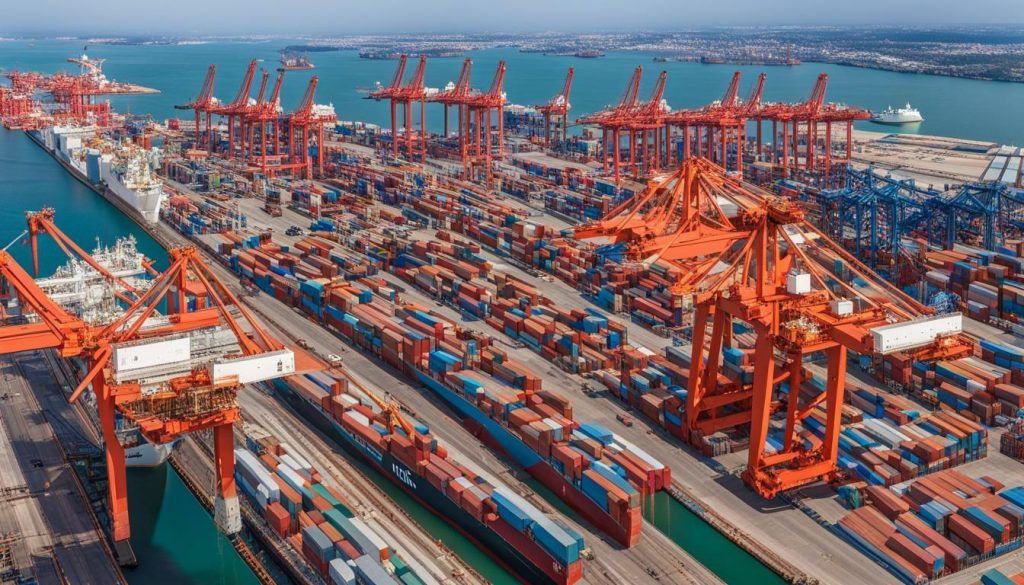
By carefully planning and executing your intermodal freight transport business, you can establish a successful enterprise that provides essential cargo shipping solutions to customers around the globe.
Setting Up Your Operations
Once you have established your intermodal freight transport business, it is essential to set up your operations. This involves acquiring the necessary equipment and establishing partnerships with carriers to ensure reliable transportation of your clients’ cargo.
One of the key aspects of intermodal freight transport is container shipping. You will need to invest in containers suitable for transporting various types of cargo. It’s important to consider the size, weight, and shape of the cargo to determine the type of container required. You will also need to ensure that the containers comply with international shipping regulations.
In addition to containers, you will also need to implement effective logistics management systems. This involves managing the movement of cargo from one point to another, tracking shipments and providing real-time updates to clients. By implementing efficient logistics management systems, you can ensure timely and reliable delivery of your clients’ cargo.
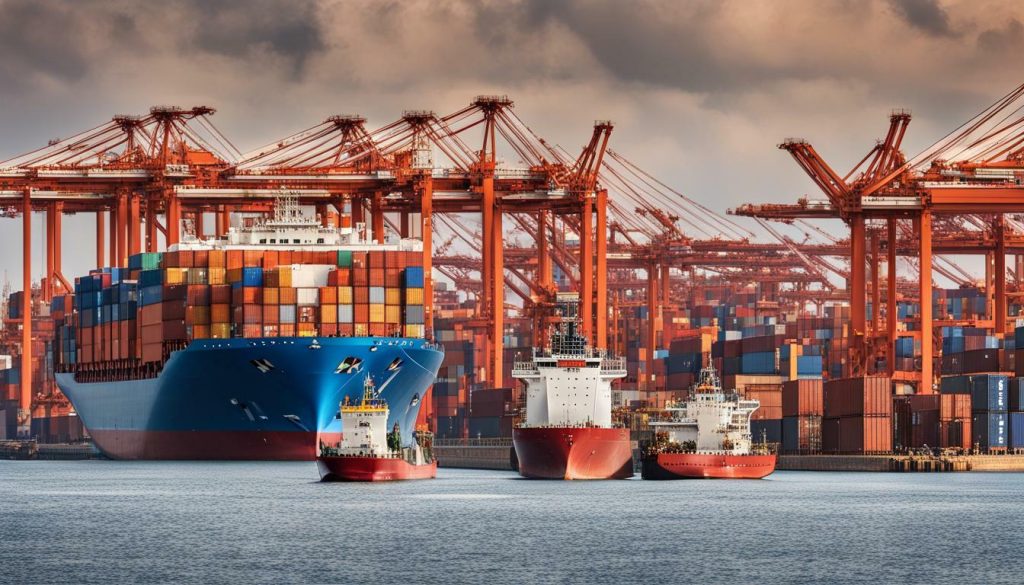
Partnering with Carriers
As an intermodal freight transport business, it’s essential to establish partnerships with carriers to provide reliable transportation services to your clients. You can partner with various carriers, including rail, road, and air carriers, depending on the specific needs of your clients.
When selecting carriers, it’s important to consider their experience, reputation, and capacity to handle various types of cargo. You should also ensure that they comply with international and local regulations to avoid any legal issues.
By establishing partnerships with reliable carriers, you can ensure that your clients’ cargo is transported safely and efficiently, thereby building a solid reputation for your business.
Marketing and Promoting Your Intermodal Freight Transport Business
Now that you have set up your intermodal freight transport business and established your operations, it is time to focus on promoting your services. As the transportation and logistics industry is highly competitive, marketing your business effectively is crucial. By utilizing a variety of techniques, you can ensure that your business stands out among the competition and attracts potential clients.
One of the most important aspects of marketing your business is establishing a strong online presence. This can be achieved by creating a professional website that showcases your transportation and logistics solutions. Make sure that your website is user-friendly and easy to navigate with clear calls-to-action throughout. You can also improve your online presence by optimizing your website for search engines with relevant keywords such as “freight logistics” and “transportation and logistics solutions”.
In addition to online marketing, networking with industry professionals can also be beneficial in promoting your business. Attending conferences, trade shows and industry events can provide opportunities to connect with potential customers and partners. It is also important to provide exceptional customer service to your existing clients, as word-of-mouth can be a powerful tool in attracting new business.
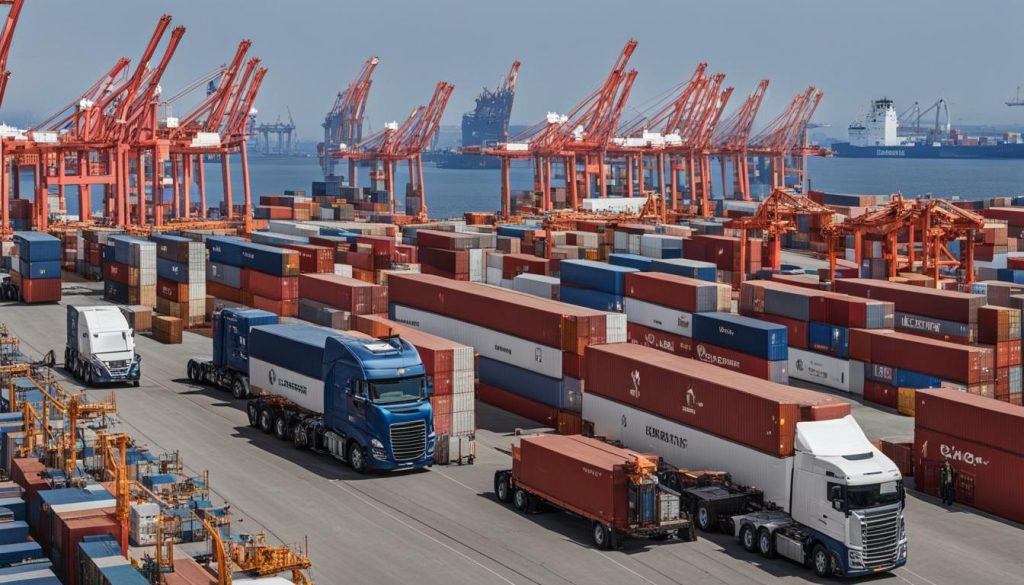
Finally, consider offering promotional deals or discounts to attract new customers and retain existing ones. This can be done by offering reduced rates for new clients or implementing a loyalty program for repeat customers. By providing exceptional customer service, establishing a strong online presence, networking with industry professionals and offering promotional deals, you can effectively market and promote your intermodal freight transport business.
Managing Risks and Ensuring Compliance
As an intermodal freight transport business owner, it’s important to manage risks and ensure compliance with industry regulations to protect your business and reputation. In the transportation and logistics industry, compliance with regulations is crucial for maintaining safety standards and meeting customer expectations.
To ensure compliance, you will need to obtain the necessary licenses and permits for operating your business. You will also need to adhere to safety regulations and implement insurance policies to protect your business from potential liabilities.
One key aspect of risk management is conducting regular safety audits and inspections to identify potential risks and hazards. This will help you implement appropriate measures to minimize the risk of accidents and ensure the safety of your employees and customers.
Another important aspect of risk management is implementing effective supply chain security measures to protect your cargo from theft, piracy, and other types of criminal activity. This can include using GPS tracking devices, security seals, and other technologies to monitor and secure your shipments.
Overall, managing risks and ensuring compliance is essential for operating a successful intermodal freight transport business. By taking the necessary steps to protect your business, you can provide reliable transportation and logistics services to your customers and build a strong reputation within the industry.
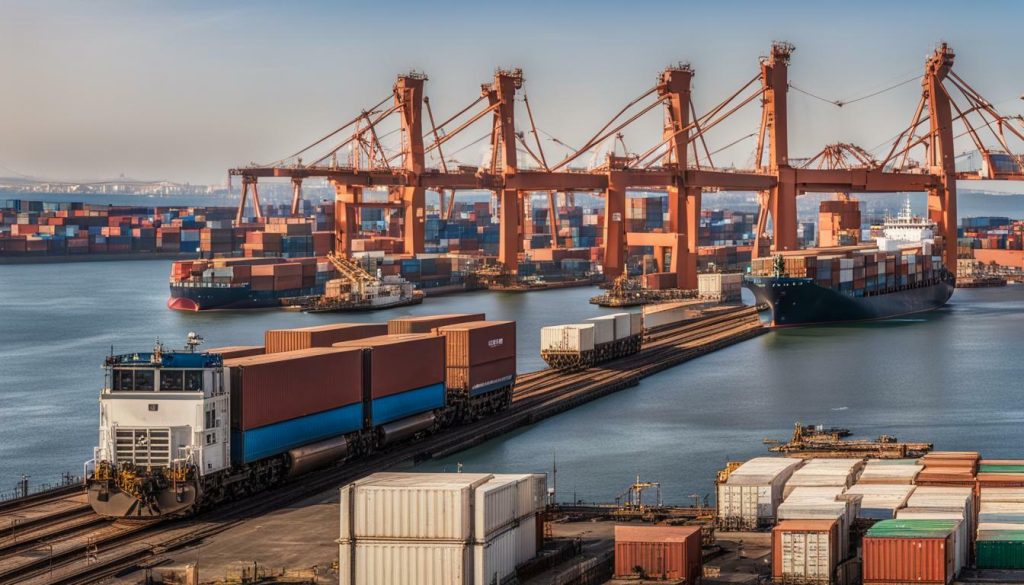
Lastly
Starting an intermodal freight transport business can be a lucrative venture with the potential for significant growth. By understanding the logistics and shipping industry, planning your business, setting up operations, marketing effectively, managing risks, and ensuring compliance, you can position your business for success.
Remember to conduct extensive market research to identify your target markets and develop a solid business plan. Acquiring the necessary equipment and establishing partnerships with carriers are crucial in setting up your operations. Additionally, implementing effective logistics management systems can help streamline your business operations.
Marketing and promoting your intermodal freight transport business is equally important, and building a strong online presence and networking with industry professionals can help you generate leads and acquire new customers. Providing exceptional customer service will help you retain your existing customers and build a strong reputation.
Lastly, managing risks and ensuring compliance with safety regulations and insurance policies is necessary to protect your business and clients.
In conclusion, with the right strategies and techniques, starting an intermodal freight transport business can be a successful and profitable venture. By applying the principles outlined in this article, you can position yourself for success and build a thriving business in the logistics and shipping industry.
FAQ on Intermodal Freight Transport Business
Q: How do I start an intermodal freight transport business?
A: To start an intermodal freight transport business, you need to conduct market research, develop a business plan, acquire the necessary equipment, establish partnerships with carriers, and implement effective logistics management systems.
Q: What is intermodal freight transport?
A: Intermodal freight transport is a method of transporting goods using multiple modes of transportation, such as trucks, trains, and ships. It offers benefits such as increased efficiency, cost savings, and reduced environmental impact.
Q: What services are involved in intermodal freight transport?
A: Intermodal freight transport services include container shipping, logistics management, freight forwarding, and global supply chain solutions.
Q: How important is proper planning in an intermodal freight transport business?
A: Proper planning is crucial in an intermodal freight transport business. It involves market research, identifying target markets, developing a business plan, and ensuring efficient operations to meet customer demands.
Q: How can I market and promote my intermodal freight transport business?
A: You can market and promote your intermodal freight transport business by building a strong online presence, networking with industry professionals, providing exceptional customer service, and offering transportation and logistics solutions.
Q: What are the risk management and compliance considerations in the intermodal freight transport industry?
A: Risk management and compliance are important in the intermodal freight transport industry. This includes obtaining necessary licenses and permits, adhering to safety regulations, and implementing insurance policies to ensure the safety of goods and compliance with legal requirements.


